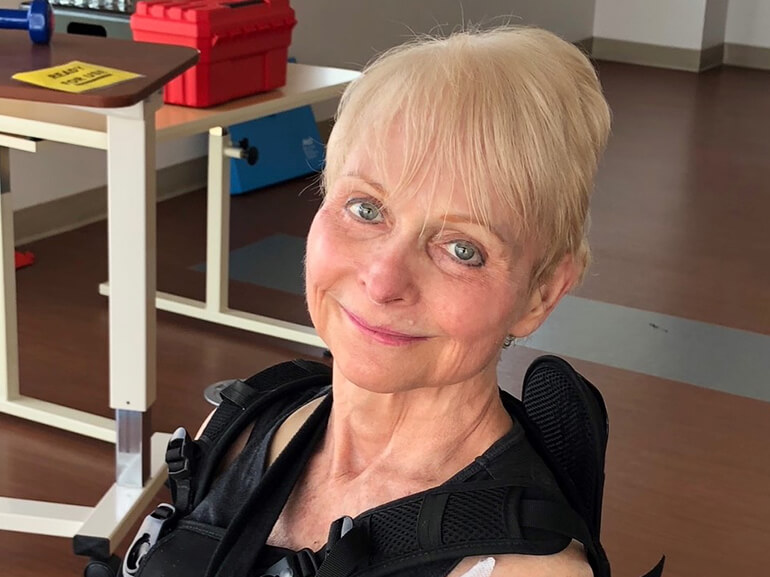Judy's Story

Judy Heurta, 68, is a mother to four adult children, a wife to Sal for 21 years and a former personal trainer. Born in Japan, Judy lived in California, Georgia and Hawaii before moving to Las Vegas, where her children live. Her hobbies include reading, fitness and spending time with her family.
In 2006, Judy underwent what should have been a minor vein surgery; unfortunately, she experienced a septic infection that caused a host of medical challenges. The infection affected her back, leading her to require back surgery in 2015 and 2017. Judy also required a total hip replacement in 2017 and a total left shoulder replacement after experiencing a fall in 2018.
Additionally, Judy’s multiple surgeries caused her to suffer from peripheral neuropathy, which is the result of damage to the nerves located outside of the brain and spinal cord and often causes weakness, numbness and pain, usually in the hands and feet. Her neuropathy made her more likely to fall, which she did several times.
When Judy began to experience pain and protruding hardware at the site of a previous spinal surgery, she opted to undergo spinal fusion surgery to have the hardware replaced. Knowing her lengthy history of orthopedic and spinal surgeries, it was recommended by her surgeon to continue her recovery at an inpatient rehabilitation hospital. Judy chose Dignity Health Rehabilitation Hospital.
Three days after back surgery, Judy arrived at the rehabilitation hospital. Her goals were to improve her walking, balance and endurance so she could be more independent and move around the house more easily. Judy’s team of physicians, nurses, physical therapists and occupational therapists developed a plan to help reach her goals and train her to return home safely.
Because Judy is a former personal trainer with a strong interest in fitness, her therapy was tailored to provide an appropriate level of challenging fitness-related activities that were both beneficial and enjoyable. In physical therapy, Judy’s therapists worked to get her moving and tried a variety of assistive devices to determine which would be the safest and most helpful for her to use. Therapists also guided Judy in dynamic balance training, which included using obstacles, foam pads and steps, most often while using the parallel bars to ensure safety. Judy and her therapists also worked on improving overall posture, strength and endurance by using specialized rehabilitation equipment.
Judy was required to wear a back brace after her spinal fusion surgery and had to follow a strict set of precautions, including no bending, twisting or lifting more than ten pounds, which made it especially difficult to perform her self-care. Judy’s occupational therapists worked to help her to learn new ways to bathe, dress and groom herself using special techniques and adaptive equipment. They also held training sessions with the on-site car simulator, which helped Judy practice safely getting in and out of a vehicle. “When I finally got in the car with my husband, it was easier than I thought it would be,” Judy stated. She also appreciated the suggestion from her therapists on using a step stool to help get in and out of the car, adding that she and her husband found a collapsible unit that they keep in the car, which makes a big difference.
Judy progressed quickly and was able to move independently in her room by the time she was ready to be discharged. Unfortunately, a few days after Judy returned home, she suffered a fall while using a four-wheeled walker. Despite having been educated to always lock the brakes, Judy accidentally leaned on her unlocked walker, causing it to collapse as she fell on top of it. The fall broke Judy’s humerus, the large bone in the upper arm, which required surgery. She admits that she should have been using a front-wheeled walker, which is more stable. “I definitely learned my lesson!” said Judy.
Judy returned to Dignity Health Rehabilitation Hospital after undergoing surgery on her humerus for physical and occupational therapy. When she began to experience complications with her surgical incision, she also received wound care and wound VAC (vacuum-assisted closure) services, which decreases air pressure around a wound to assist in healing. She continued with therapy to improve her strength, balance, mobility and ability to perform self-care independently. After her second discharge, Judy needed to return once more for drainage and wound care after she developed a hematoma, which is when blood collects and pools under the skin. She continued to build on the progress she had made in therapy during her two previous stays.
While Judy’s experience of returning to Dignity Health Rehabilitation Hospital three times in two months is unusual, she is grateful for the support and training she received during her stays. Judy credits her team for helping her make significant improvements in her balance, posture and walking, as well as providing her with increased safety awareness to avoid any future falls. Now back at home for good, Judy is enjoying sleeping in her own bed and spending time with her family and dogs.
Of her time spent at Dignity Health Rehabilitation Hospital, Judy has only positive things to say. “Everyone was great! I will miss having my training sessions,” Judy said. “I feel like the staff worked hard to give me the therapy that was right for me.”